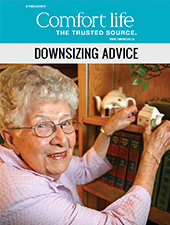Talking About Your Parents' Finances

When families get together during the holidays, adult children’s concerns about their aging parents can deepen. And while our parents’ health is usually our biggest concern, their finances are often not far behind.
Our parents' finances are usually none of our business…except when they become so. Just ask a friend of mine whose mother has made some very bad financial investments. My friend is helping her mother pay back tens of thousands of dollars of debt while also chipping in to support her from one month to the next. The Toronto Star reported last year about many elderly Torontonians bilked out of considerable investment money by someone they thought they could trust. In the past, we at Comfort Life have covered other tales of elderly parents and financial woes, such as the story of a woman from Arizona who found that her dad had racked up $30,000 of debt in a few short months. He had lived well beyond his means, leaving her to straighten out the financial mess.
Overcome the generation gap
Suffice it to say that there are many different ways that parents' finances can go horribly wrong. And it's likely not helpful to assume that everyone is on the same page. A US survey in October concluded that 63 percent of elderly parents thought their kids knew about their finances but only 42 percent of adult children agreed.
Do you think you might need to know your parents' financial business? What can you do to avoid problems like those listed above? How do you find out what you really need to know about your parents' money? When I wrote about this several years ago, my dad got mad at me, even though I had only mentioned him in passing. How do you approach the subject without causing undue conflict?
Here are five things to consider if you think you should approach the subject of finances with your parents:
Pick the right representative. In every family there is one child best suited to broach this subject. Perhaps that child is the one closest to the parent or perhaps there is another child better suited to discuss financial matters. In our family, this was an older sister who was well trusted by my dad and who had also spent many years as a bookkeeper for a small company in her hometown. She was the ideal person to gain access to my dad's financial affairs.
Choose this representative wisely and have only one child approach the subject once. If it doesn't go well, you'll have to try a different tack. But even if it goes badly, the conversation might still plant a seed that will blossom into openness at some time in the future.
Appeal to their sense of responsibility. Elderly parents who have lived through the Depression, the hardship of World War II or immigration (or all of the above!) will have a strong sense of fiscal responsibility. Appealing to their responsibilities toward you and their grandchildren "after they're gone" might be a good way to get them to share with you what plans they have, and for you to gage how sound those plans are.
Try talking about yourself first. Cheryl J Sherrard, a financial consultant in Charlotte, NC., rightly notes that for many elderly people, "money is a very private thing. Being independent and able to control these things themselves is very important."
She recommends that it can be tactful for kids of elderly parents to try a "show and tell" process. Talk about your own estate plans then ask them what they think. "Instead of being perceived as prying into their lives, you are asking them for advice. Sometimes these conversations can open up the door to a new level of communication with your parents, one that is based on the sharing of important information in a very nonthreatening manner," says Sherrard.
Find a financial advisor they will trust possibly without them knowing about it, and hire him or her to talk to your parents. Sherrard writes, "As an unbiased third party, the advisor can discuss many of the issues your parents face in the normal course of their relationship with them."
Choose a time wisely. The upcoming holidays might seem like an opportune time but trying to broach a subject like this during a family gathering might be one of the worst mistakes you could make. After the party's over and things have settled down, possibly after a glass of wine together, with just you and your parent, you might want to start a conversation, "There's something I want to ask you, dad, and I know it's a very sensitive area…."
Be deeply sensitive, though. Don't even raise the subject if you are not sensitive to every nuanced turn that the conversation might take.
Good luck.
And have great holiday with your parents first!
(This article revisits an issue the author discussed over two years ago, for a newsletter on Your Parents’ Finances)


